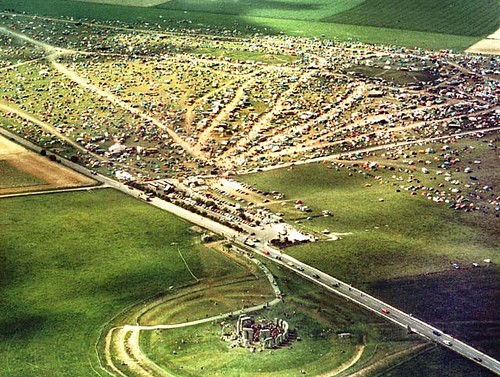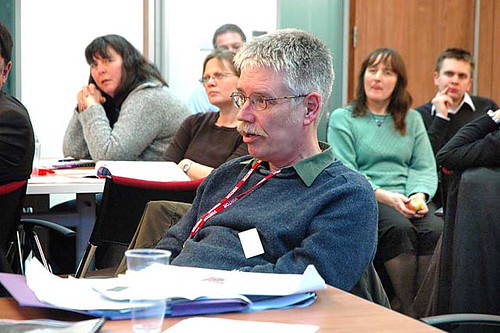Over recent years, government has passed legislation to allow the citizen to get a copy of information, held by public authorities on policy issues [general matters], and about the individual [only yourself as an individual].
Data Protection Act 1998
http://www.opsi.gov.uk/acts/acts1998/19980029.htm
Freedom of Information Act 2000
http://www.opsi.gov.uk/acts/acts2000/20000036.htm
Environmental Information Regulations 2004
http://www.defra.gov.uk/corporate/opengov/eir/guidance/index.htm
Now although there are lots of “ifs, buts, maybes and perhaps’s” ….. dotted about within the legislation, they are useful for gathering information, that up to only a few years ago, was very hard to access. They are all designed for the ordinary citizen to be able to get information to help keep ‘big brother’ in some kind of check.
Further, to empower the individual, through access to information, to hold those in power to account on many issues. They are all vastly underused by ordinary folks, but they have become a standard tool of journalism. There are frequently many news items on TV or newspaper that start with the words:
“according to information obtained by the media under the Freedom of Information Act, we have discovered such and such about the subject ……. >”.
I encourage all, who are concerned about issues to make greater use of these facilities. I believe it one of the better things that the current government have done. Please use them.
I guess firstly, there should be some pre-amble on what each is for.
The Freedom of Information Act 2000
The Freedom of Information Act had come into force from 1st Jan 2005. It is only part of the new openness package. There is also the Environmental Information Regulations (EIRs),
Application for information under this act is free. It applies to all public bodies and authorities in the UK.
You should use this, when wanting to know matters of policy and generally what they’re up to, why, and how much ‘it’ costs. What research has been done, what are the implications and what are you going to do next?
There are ‘get-out’ clauses in the wording, like exceptions for ‘commercially sensitive’ information, national security implications, costs of complying with your requests and many others. Don’t then just give up! But, without giving you a full run-down here, if refused you can then make other applications asking for the same information over shorter time scales for example. Doesn’t always work, but, be creative in rewording, and go round again and try. You should receive a reply, the information requested, or an explanation of why not within 20 days.
The Environmental Information Regulations are similar in status and all the above applies.
They implement an EU directive, that came into force at the same time as the FOI. These provide a more powerful right to information about pollution, conservation, the natural environment, land use, road building, genetically modified organisms, air and water-borne diseases, food contamination, financial and many other issues. The regulations include the utilities and private contractors acting on behalf of a public authority.
Data Protection Act 1998
Now, coming to the Data Protection Act. The object is to enable the citizen to check what information is held about them by a public body or authority, and to further check that the information is accurate. Hence, you apply under this act for information about yourself as an individual. You may not apply for information about anyone else.
Section 7 of the Data Protection Act 1998 states that a “data subject” (the person about whom the personal data refers) is entitled, upon written request, to be informed whether or not personal data is held or processed about them.
————————————————————————-
Section 7 of the Data Protection Act 1998
Rights of data subjects and others
7 Right of access to personal data (1) Subject to the following provisions of this section and to sections 8 and
9, an individual is entitled-
(a) to be informed by any data controller whether personal data of which that individual is the data subject are
being processed by or on behalf of that data controller,
(b) if that is the case, to be given by the data controller a description of-
(i) the personal data of which that individual is the data subject,
(ii) the purposes for which they are being or are to be processed, and
(iii) the recipients or classes of recipients to whom they are or may be disclosed,
(c) to have communicated to him in an intelligible form-
(i) the information constituting any personal data of which that individual is the data subject, and
(ii) any information available to the data controller as to the source of those data, <snip> ……
————————————————————————-
http://www.opsi.gov.uk/acts/acts1998/ukpga_19980029_en_3#pt2-l1g7
This is making a ‘Subject Access Request’. Now, you might want to check on your own criminal record, driving convictions, parking tickets, council tax records, medical information, I mean, they know lots about us, don’t they?
But, a main object here is perhaps to use it to look into our surveillance. It is the way I have exercised my right, to take a peek!




Two areas of interest here are the CCTV systems we live life under now-a-days and the police teams we find at public events, demonstrations, protests, festivals, while being a minority group etc …….
With respect to CCTV, there is not a uniform pattern of ownership in the UK. Here in Nottingham, the city cameras are owned and administered by Nottingham City Council.
Surveillance of Nottingham city centre:
http://indymedia.org.uk/en/regions/nottinghamshire/2006/03/335022.html
This gives a flavour of the nature of the machine. There is then co-operation between the City council operations and the police in their use.
Generally speaking, there should be a plate, publicly viewable, with the contact details / number of the ‘data controller’ for the system. So, if inclined to see video of yourself, walking across the Market Square on a Saturday afternoon, surveyed by the numerous cameras there, then your application would be to Nottingham City Council. You would do so on the form [links below] stating details like times, dates, locations, and your appearance.
The Data Controller, a designated person within their operation would then have to record your application, identify you and so as to make sure that no other personal data about anyone else present within the frame, would have to go through a technical procedure to ‘blob-out’ all others that appear. A time-consuming and expensive procedure!
Ownership of these systems is different throughout the country and so please make sure you know which authority is responsible for the cameras operations.
With the police, things are a little more obvious. The uniform gives it away. Mostly, they are clearly policemen, but sometimes civilians working for the police. These will be accompanied.
If you’re at events, say you are lawfully protesting on an issue, you’re not breaking the law and yet you are photographed or videoed by officers. May I suggest the following:
1. Stay calm. Do not be rude or physically obstructive. [charges under public law frequently then ensue].
2. Note, time, date, and place, this should include what police force area are you in.
3. Note the force, the surveillance officer is from. Not always the same as your location.
4. If you can also note the officers shoulder number, and if you’re up for it photograph the officers yourself. [helpfully including force badge and number]. If you’re not, then a simple note on paper.
5. Some policemen, sent into the field for intelligence gathering are quite chatty. Who are you with then? Where do you come from? Do you do this sort of thing much? Nice weather were having …. oh and so on. I am always polite, but do not engage.
6. Shortly after incident, make a brief note of the info above, together with a few paragraphs on the circumstances.
7. When back at base, if you have internet access, call up the police force website for where you were. There is a ‘map index’ of uk forces at: http://www.police.uk/forces.htm If not on the internet, ring a police station and ask for the address of the ‘Data Controller’ at the force HQ.
8. All forces have a different website layout, but all have either ‘data protection’ or ‘freedom of information’ links from the front page. They all then contain standard guidance for the application your making, and you should find a ‘forms’ link where you can download the application form, usually as a PDF for you to print out. There will also be a direct contact phone number if you need further assistance. Fill out the info above on the form.
9. They ask for proof of identity. They must do this, or you might ask for the personal info on someone else. [this is not allowed]. They also ask for a photo of you, the subject! This is the scary bit for many folks. However, you are asking them for copies of your image, taken by them, I have never understood what the problem is here. They already have it!
10. Stick the whole thing in an envelope and send, recorded delivery post, to the address instructed. It costs £10 and you should expect to receive the video, photos, notes of what you asked for, within 40 days.
Links
Data Protection Act 1998 http://www.opsi.gov.uk/acts/acts1998/19980029.htm
Freedom of Information Act 2000 http://www.opsi.gov.uk/acts/acts2000/20000036.htm
Environmental Info Regs 2004 http://www.defra.gov.uk/corporate/opengov/eir/guidance/index.htm
Information and encouragement to use the Freedom of Information Act 2000
http://indymedia.org.uk/en/regions/nottinghamshire/2005/10/325499.html
Nottinghamshire Police: Freedom of Information: http://www.nottinghamshire.police.uk/freedom
Nottinghamshire Police: Application form:
http://www.nottinghamshire.police.uk/uploads/library/73/FOI%20request%20form.pdf
Nottinghamshire City Council: Data Protection
http://www.nottinghamcity.gov.uk/sitemap/services/council_government_and_democracy/information_governance/data_protection.htm
Nottinghamshire City Council: Freedom of Information Act
http://www.nottinghamcity.gov.uk/sitemap/freedom_of_information
Metropolitan Police: Data Protection http://www.met.police.uk/dataprotection
Metropolitan Police: Data Protection Application form
http://www.met.police.uk/dataprotection/forms/3019a.pdf
‘Map index’ of uk forces at: http://www.police.uk/forces.htm
UK FOIA requests – Spy Blog http://www.spy.org.uk/foia
Campaign for Freedom of Information http://www.cfoi.org.uk/
Information Commissioner monitors and supervises the implementation of the Acts
http://www.informationcommissioner.gov.uk/
Complaint Form [if the authority doesn’t comply with your request]
http://www.ico.gov.uk/upload/documents/library/data_protection/forms/ico-datap-how2comp-form.pdf
FIT Watch http://www.fitwatch.blogspot.com/
Forward Intelligence Teams – FIT operate under the Public Order Intelligence Unit (CO11) at New Scotland Yard and has responsibility for collating and disseminating intelligence.
http://www.met.police.uk/publicorder/intelligence.htm Their website content is a little sparse!
Met Police: Overt Filming / Photography Leaflet
http://www.indymedia.org.uk/en/2007/02/363276.html
American Judicial Decision: NYPD Spy Tactics Exposed: Democracy Now! Airs Exclusive Police Surveillance Footage Recorded From Blimps, Helicopters and “Lipstick Cams” During Republican National Convention Monday, February 19th, 2007
http://www.democracynow.org/article.pl?sid=07/02/19/1545225&mode=thread&tid=25
Watch 128k stream http://play.rbn.com/?url=demnow/demnow/demand/2007/feb/video/dnB20070219a.rm&proto=rtsp&start=46:16
Watch 256k stream http://play.rbn.com/?url=demnow/demnow/demand/2007/feb/video/dnB20070219a.rm&proto=rtsp&start=46:16























































